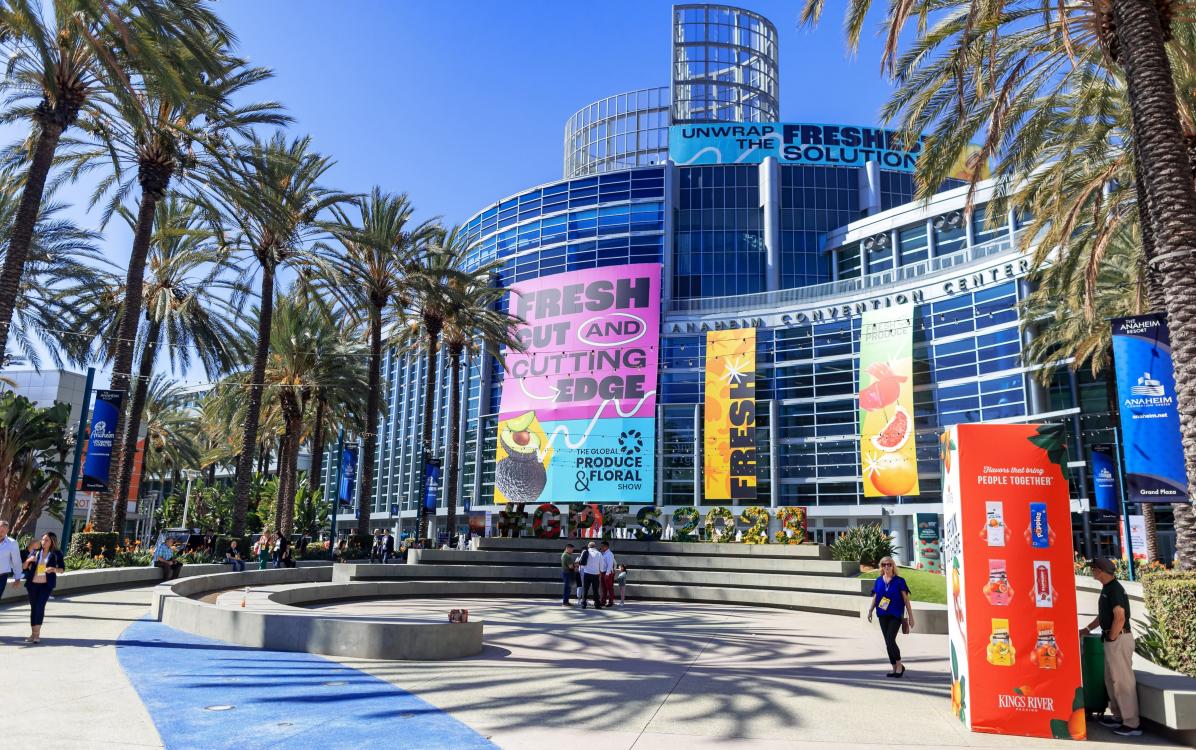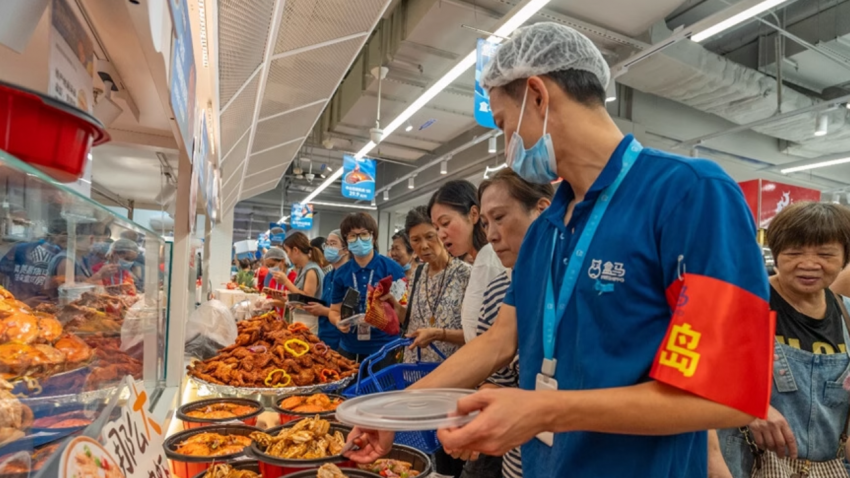You are here
Back to top[Press Release] 2023 IFPA State of the Industry: AI, Sustainability, and Consumer and Workforce Trends

This content has been published as provided by its author. It has only been modified from its original version to follow Produce Report editorial guidelines and for necessary website formatting.
Anaheim, Calif., Oct. 19, 2023 – Citing a host of challenges facing the global fresh produce and floral community — ranging from geopolitical tensions, extreme weather events, consumer health trends, emergent technologies like generative AI, and more — International Fresh Produce Association CEO Cathy Burns emphasized action and advocacy as the vehicles through which the organization and its members will overcome these hurdles together in the second annual State of the Industry address at the 2023 Global Produce & Floral Show in Anaheim, California.

“We must look at how the state of things are, envision what we want the state of things to become, and most importantly, ACT to make it happen,” she said. “The good news is this industry knows how to invent from within and tap into innovation from outside our community.”
Rise of Artificial Intelligence
Technologies such as generative AI and 3D printing of food were cited as examples of innovation from outside the produce and floral community, as well as a palm scanner that measures how many vegetables a person has consumed. However, AI’s potential to reinvent many aspects of life was shown in:
- Retail and foodservice applications of AI that enhance the customer experience, primarily suggesting meal solutions.
- Floral applications where AI-powered robots design flower arrangements via robotics.
- Food waste applications, including dynamic pricing systems based on product freshness and AI-powered scanners that detect ripeness.
- Consumer applications of AI, such as smart cutting boards that helps track nutrition and calories as well as apps that use what’s in the refrigerator to recommend meal possibilities.
Burns cited McKinsey data that found, in agriculture, AI will most likely impact sales and marketing, software engineering, and supply chain logistics.
“While it is a bit early to paint AI as a villain, the reality is that businesses may struggle with its implementation and implications, especially since some work functions will likely evolve. Activities that absorb 60 to 70% of employees’ time today could be automated,” she said.

Health of the World
Extreme weather events have more than doubled in the past 30 years and could force more than 122 million more people into hunger and poverty within the next seven years.
To help the produce and floral community understand the implications of this issue, Burns shared highlights from a recent IFPA global study on creating a climate-resilient future:
- The world is currently on a path to a global mean temperature rise in the range of 1.5 to 4.5 degrees Celsius by the end of the century. The higher end of this range would push agriculture far beyond manageable thresholds.
- Climate change is the second-biggest consumer issue (following inflation) that needs action from governments, the public, and businesses.
- Consumers expect businesses and producers to, at a minimum, help solve insufficient supply of safe and nutritious food, overconsumption, and waste.
“IFPA’s sustainability strategy includes IFPA having a seat at larger tables where food systems conversations are happening. We continue to lead environmental benchmarking work within the Consumer Goods Forum to ensure the most realistic and workable standards are created to provide consistency for the supply chain,” Burns noted. “We are also participating in the November COP28 conference in Dubai to ensure industry representation and that fresh produce and floral is part of the solution though climate-smart agriculture practices.”

Health of Employees
While businesses the world over grapple with sustainability from an environmental perspective, human sustainability (defined as what happens when companies embrace helping their employees become healthier, more skilled, and connected to a sense of purpose and belonging) has emerged as a priority.
Currently, 48% of employees and 53% of managers report they’re burned out at work. “The reality is when people are burned out, they are less engaged. And that low engagement costs the global economy $8.8 trillion,” Burns said.
She added that the key to getting and maintaining a competitive edge is not only developing people and managing them well, but also ensuring their well-being is maintained because failure to support employee well-being costs $322 billion per year globally in lost productivity.
Diversity, equity, and inclusion (DEI) in produce and floral remains a key part of IFPA’s strategic work and the organization recently launched a toolkit to help its members along their DEI journey.

Health of Consumers
Global rates of obesity and diabetes continue to grow, with more than half of the world’s population expected to be overweight or obese by 2035 and roughly half a billion people currently living with diabetes worldwide, with more than 95% having type 2 diabetes.
With the U.S. CDC finding more kids ages one to five consumed a sugar-sweetened beverage than they consumed a daily vegetable or a daily fruit and that one in three kids did not eat a daily fruit and nearly one-half did not eat a daily vegetable, Burns doubled down on IFPA’s nutrition policy initiatives.
“IFPA will continue to fight for full fruit and vegetable benefits in the WIC program and will continue efforts to have interventions like produce prescriptions embedding into the healthcare system and integrating them as a part of standard practice of clinical care,” Burns said. “IFPA’s collaboration with a North Carolina nonprofit saw it transform a $500,000 produce prescription grant into an $8 million in redemption of fruits and vegetables in a little over a year.”
In addition to IFPA’s policy efforts, the IFPA Foundation for Fresh Produce will work to grow consumption through a portfolio of consumer-related programs and offerings.

Action Is the Answer
With these challenges and opportunities in front of the industry, Burns called on IFPA members and the industry at large to be ready to advocate locally, domestically, and globally.
“You have said advocacy is your priority and you want it to be ours. IFPA has punched the advocacy accelerator. This community is THE voice of authority, and we can help solve some of the biggest problems in the world,” Burns remarked. “We are here to get more people to eat more fresh fruits and vegetables and buy floral more often. Period. And we will act on that through a three-pronged approach of government relations, public relations, and consumer relations.”
“Change starts here. Growing consumption starts here. Changing the world through advocacy starts here. Creating a vibrant future for all starts here,” she said. “It’s the easiest thing in the world to say, ‘Someone ought to fix that.’ We ARE that someone. Yes, it will feel overwhelming at times, but no matter the size, nature, source, or timing of any challenge, action is the answer, always.”
About the International Fresh Produce Association (IFPA)
The International Fresh Produce Association (IFPA) is the largest and most diverse international association serving the entire fresh produce and floral supply chain and the only to seamlessly integrate world-facing advocacy and industry-facing support. We exist to bring the industry together to create a vibrant future for all. We grow our member’s prosperity by conducting advocacy; connecting people and ideas; and offering guidance that allows us all to take action with purpose and confidence.
Images: IFPA

















Add new comment